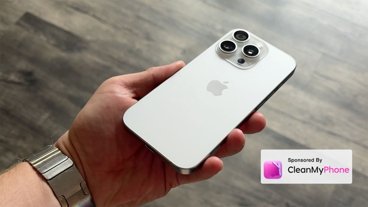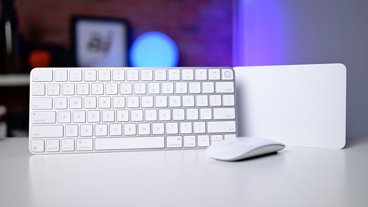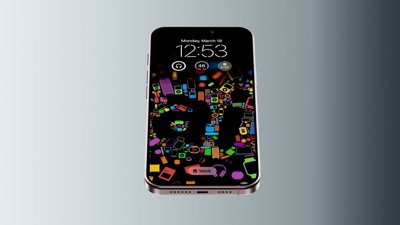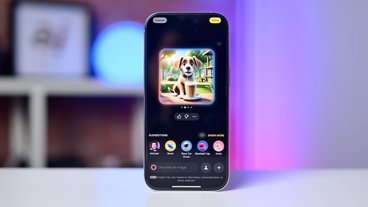Analyst Ming-Chi Kuo has reaffirmed predictions that the first Apple AR headset will launch at the end of 2022, but now says it will be a much more powerful device than expected.
Backing up his previous claim that Apple will launch its first augmented reality headset at the end of 2022, Ming-Chi Kuo says it will be a standalone device.
Recent rumors have pointed to the first Apple AR headset being an accompaniment to the iPhone, much as the Apple Watch is. Specifically, it has been believed that the headset would offload most of its processing to the iPhone.
Now, however, in a note to investors, Kuo has said that the headset will have a main processor that is the equivalent of the M1. What's more, it will have a second processor that handles all sensor-related computing, for example with eye tracking and gaze detection.
"[The] computing power of the sensor is significantly higher than that of the iPhone," said Kuo. "[The main processor will have] the same level of computing power as Macs. The power management unit (PMU) design of the high-end processor is similar to that of M1 because it has the same level of computing power."
Kup predicts that the headset will feature two 4K micro-OLED displays, made by Sony, "which require significantly more computing power than the iPhone, thus needing a Mac-level processor."
Kuo further claims that the device will support a "comprehensive range of applications rather than specific applications." So rather than being, effectively, bespoke for certain AR purposes, it could perhaps enable a headset App Store.
"Apple's goal is to replace the iPhone with AR in ten years," continues Kuo, "representing the demand... [for headsets will] exceed at least one billion... in ten years."
Kuo's conclusion there may be based less on inside information, than on market analysis.
"If the AR headset is positioned only as an accessory for the Mac or iPhone, it will not be conducive to the growth of the product," he says. "An AR headset that works independently means that it will have its own ecosystem and provide the most complete and flexible user experience."
Separately, investment bank Morgan Stanley has recently claimed that Apple will be launching AR soon. It also advised clients that the AR field will see "liftoff" once Apple enters the market.
 William Gallagher
William Gallagher













 Charles Martin
Charles Martin




 Malcolm Owen
Malcolm Owen
 Andrew O'Hara
Andrew O'Hara








11 Comments
The optics and driving of the screens seems to me to be the least interesting part. Existing players in the space have got the headset, screens and motion movement down reasonably well. The far more interesting aspect is what Apple will do with UI, and the actually functionality of the thing. Without some real movement in those, meh, it's just another toy.
May Apple destroy Metta or whatever FaceBook tries to call itself at that point in time.
The expertise that Apple has built up with Apple Silicon continues to make more and more sense.
It's a really exciting idea, I must say, because there is definitely already a market, although tiny at the moment because of huge prices for VR HUDs and always (ok no, but usually) a requirement to own an expensive, loud desktop PC with insanely expensive RTX card from the scalper market. I think Apple is going to show something "kind of impressive" in the first iteration, and a year later, the VR App Store is going to have tens of thousands of apps in all sorts of areas we haven't seen used to their full potential yet. Games are already mainstream in VR, but Apple can bring innovation in hospital simulation/medical appliance apps, surgery training, etc. There's all sorts of things: maybe driver's school apps where people can simulate driving inside a car and stuff. I mean, actual driving school simulations as a bonus complementary training to real driving – not kids games.
I can also see a future where health-related apps will offer users wild experiences: "climb the Mount Everest from the comfort of your home – no freezing, nothing dangerous going on at all!". Just imagine those TV commercials and Youtube ads: "tired of lockdowns? Have you not been able to travel the world for several years? Well, the wait is over! Travel in VR to every place of the world! Climb every high mountain – and sync it to your Apple Watch. Get the Himalaya Climber Achievement in the morning and sit on your bike with your VR goggles on, experiencing a live stream of a Tour de France biker in the evening from their head-mounted camera!".
I mean ... what can you do to try impress buyers with a smartphone these days? "Buy the latest iPhone so you can continue watch some more .. uhm .. Instagram videos, and ... read the latest newspapers .. and play some mobile games". Despite still being popular and used every day, every minute, people already have smartphones and it's just everyday business as usual, so people keep their current smartphones for longer and it's getting tougher to convince people to upgrade as often as some manufacturers might have hoped.
I also imagine the stock price going through the roof for AAPL if it takes off in a big way. But on the other hand, with the wrong price, there might be a few select people buying it. It depends on their strategy.